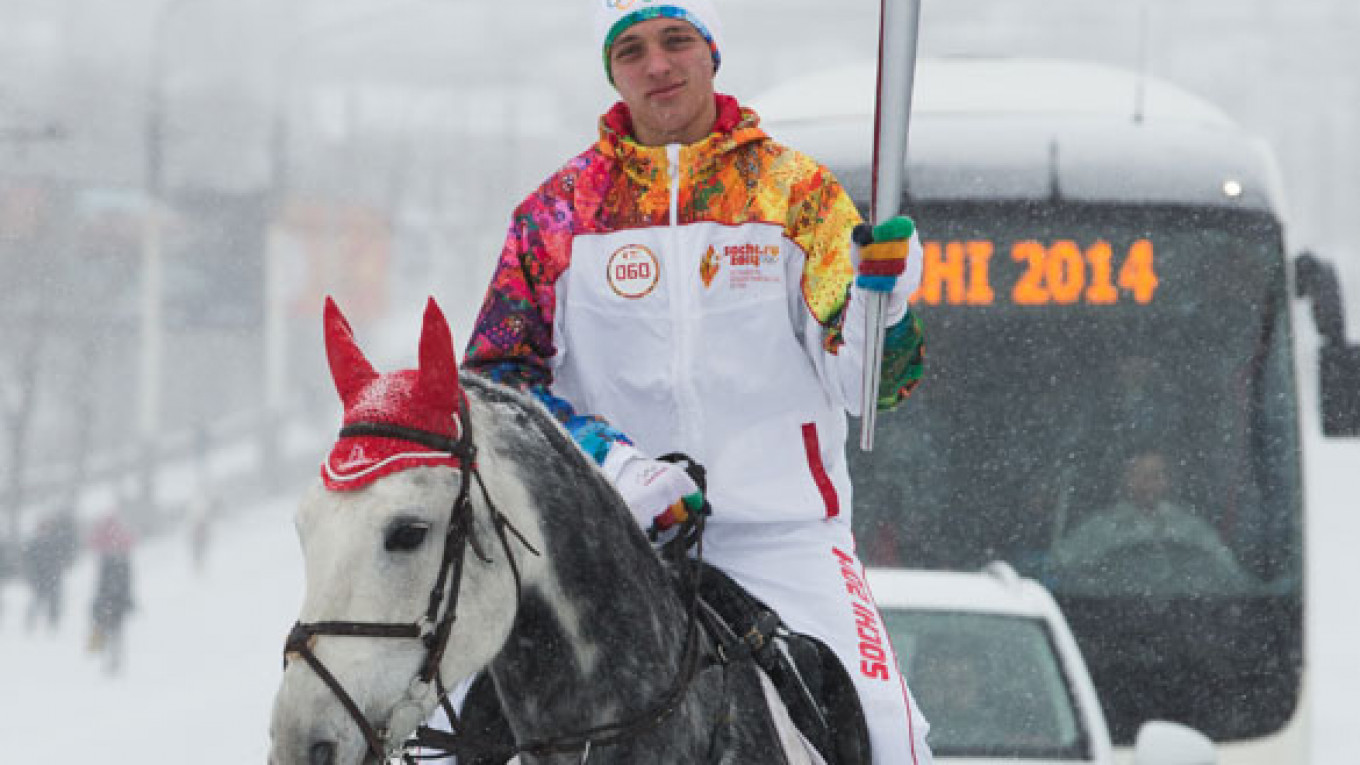President Vladimir Putin on Friday said there would be no discrimination against gay athletes at the Sochi Olympics and apparently sought to dispel concerns about security.
Experts dismissed his assurances, however, saying that only foreign gay athletes would evade harassment and only for the duration of the Olympics, while security forces could not provide a 100 percent safeguard against possible terrorist attacks.
In an interview given to a small group of Russian and foreign reporters, Putin also denied that officials had embezzled funds allocated for the Olympics — an accusation made by Gian-Franco Kasper, a Swiss member of the International Olympic Committee, who said earlier in January that one-third of the funds, or about 13 billion euros ($17.6 billion), was stolen.
"It seems to me you know everything about the Olympics. … Or you think you know everything and I will hardly be able to gain you over. But if there is such a chance, you are welcome, I will gladly talk to you," Putin said in the interview posted on the Kremlin's website on Sunday.
Putin denied allegations of corruption made by Kasper, saying critics have "no objective data" about the supposed embezzlement of Olympic funds.
Asked whether foreign gay activists would be prosecuted in line with the Russian law that bans gay propaganda among minors if they decide to protest the law at the Olympics, Putin said: "I assure you that not one of our guests will face any trouble."
Putin called foreign criticism of Russia's anti-gay law an "attempt to keep Russia's power in check," adding that in 70 countries, and in several U.S. states, homosexuality is considered a crime.
"For some reason, no one says anything about it, but they talk about us, although we do not have a criminal responsibility for it," Putin said.
But Nikolai Alexeyev, Russia's most prominent gay rights activist, said Putin's argument about other countries is only valid "if we are ready to put ourselves on the same level as underdeveloped countries of the African continent."
As for certain states in the U.S., homosexuality is banned in several of them only "on paper," but "they are not practiced," Alexeyev said by phone, explaining that he had consulted U.S. lawyers on the matter.
Commenting on the permission for foreign gay athletes to protest Russia's anti-gay law during the Olympics, Alexeyev said, "That's the way it should be in everyday life."
Discrimination against gays in Russia is "exaggerated" in the eyes of foreigners, but it would be "wrong to say that the anti-gay law is not practiced," Alexeyev said.
Another concern mentioned by Putin is security at the games, an issue that came to the foreground after last month's deadly bombings in Volgograd.
Putin said security forces were working "with a clear view of the tactical situation forming around Sochi and in the region in general."
"We have a perfect understanding of what the situation is, what the threat is, how to cut it short, how to fight it," he said.
Around 40,000 law enforcement and security officers will be working in Sochi, using international experience in providing security at similar events, Putin said, adding that the region would be protected from the air, the sea and the mountains.
Security expert Andrei Soldatov, however, begged to differ with Putin's reassurances, saying "no one can give a 100 percent guarantee" against a bombing.
"When we talk about terrorist acts, it is not about forces and means, but about the exchange of information between various units," Soldatov said by phone.
"This problem was not solved 10 years ago in Russia, nor it is now, which is proved by the Volgograd bombings, and it will hardly be solved in a few days before the Olympics," Soldatov said.
As for calls to boycott the Olympics, Putin said such ideas are a "rudiment of the former, old way of thinking, and this is bad."
The Olympics are "intended exactly for depoliticizing the most acute international issues and create extra opportunities for building bridges," Putin said.
"It is silly not to use this opportunity. It is even sillier to burn these bridges," he said.
Contact the author at n.krainova@imedia.ru
A Message from The Moscow Times:
Dear readers,
We are facing unprecedented challenges. Russia's Prosecutor General's Office has designated The Moscow Times as an "undesirable" organization, criminalizing our work and putting our staff at risk of prosecution. This follows our earlier unjust labeling as a "foreign agent."
These actions are direct attempts to silence independent journalism in Russia. The authorities claim our work "discredits the decisions of the Russian leadership." We see things differently: we strive to provide accurate, unbiased reporting on Russia.
We, the journalists of The Moscow Times, refuse to be silenced. But to continue our work, we need your help.
Your support, no matter how small, makes a world of difference. If you can, please support us monthly starting from just $2. It's quick to set up, and every contribution makes a significant impact.
By supporting The Moscow Times, you're defending open, independent journalism in the face of repression. Thank you for standing with us.
Remind me later.






